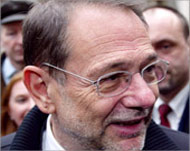EU: Iran must allow nuclear inspections
In a thinly-veiled reference to Iran, the European Union said on Monday resorting to military action might be necessary as a final measure to address threats from states that seek to acquire weapons of mass destruction.
 |
| Solana and EU foreign ministers support the use of force |
For the first time, EU foreign ministers have agreed on a policy to fight the proliferation of nuclear, biological and chemical weapons.
The policy included the possibility of using force after failing to resolve the issue diplomatically against states or what they called “terrorists” that acquired such weapons.
They also called on Iran to allow wider UN inspections of its nuclear programme, linking the Islamic republic’s acceptance to its trade interests with the European Union.
The European Union said Iran should accept immediately and unconditionally more inspections if it wanted a trade deal with the 15-nation bloc.
But Iran announced on Monday that it would reject any link of its trade issues with talk about its nuclear programme.
“It is the policy of Iran not to accept any preconditions on the basis of trade we have”, said Mohammed Jaafar Mojarrad, vice-president of Iran’s Central Bank.
IAEA report
 |
| Al-Baradei: Iran must sign the additional protocol |
The EU position came hours after the head of the International Atomic Energy Agency (IAEA), Mohammed al-Baradei, said Iran had failed to report certain nuclear activities, but was taking action to rectify the situation.
Al-Baradei urged Iran to sign an “additional protocol” to the Nuclear non-Proliferation Treaty (NPT), which would allow inspectors to appear at Iran’s nuclear facilities at short notice.
The IAEA director-general’s statements came as part of a report on Iran’s nuclear programme during a meeting of the IAEA board that consists of representatives of 35 member states.
“The report points out that Iran has failed to report certain nuclear material and activities and that corrective actions are being taken in cooperation with Iranian authorities”, al-Baradei said.
“(Iran should) conclude and bring into force an additional protocol at an early date in order to enhance the Agency’s ability to provide credible assurances regarding the peaceful nature of its nuclear activities”, al-Baradei said.
Shortly afterwards, Iran announced it was considering the possibility of allowing additional UN inspections of its nuclear facilities.
The spokesman for Iran’s atomic energy body, Seyed Khalil Mussavi, said his country was “in the process of studying, with a positive approach, the additional protocol”.
He added, however, that Iran has not yet reached a conclusion.
International calls
Iran’s new position came amid mounting international calls for the Islamic republic to sign the additional protocol.
“It is something which everyone must sign and I hope the Iranians will sign it”, EU foreign policy chief, Javier Solana, said.
But Solana expressed the European Union’s desire to continue its dialogue with Iran.
“We don’t want to cut dialogue with Iran, but it must be a dialogue based on openness”, he told reporters at a meeting of EU foreign ministers in Luxembourg.
British Foreign Secretary, Jack Straw, said it was “essential” for Iran to comply with the NPT and improve its human rights record.
Iranian President Mohammed Khatami denied Monday that his country was seeking to develop weapons of mass destruction.
“Iran wants a region that is free of weapons of mass destruction, and has no activities aimed at producing such arms”, he said.
Iran has been under massive pressure from the United States, which accuses the Islamic republic of using its atomic energy programme as a cover for developing nuclear weapons.